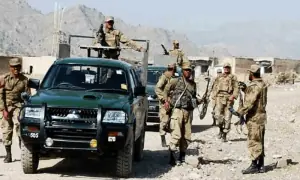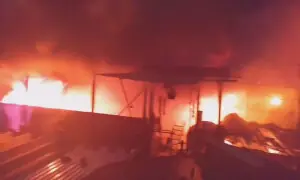How banned TTP evolved into a major security threat following Kabul fall
2 min readSecurity sources warn that the outlawed Tehrik-e-Taliban Pakistan (TTP) has evolved into a highly structured insurgent group, consolidating 42 factions under a centralized command by 2024.
Under Noor Wali Mehsud’s leadership since 2017, the group has restructured itself into a Taliban-style governance model, complete with shadow ministries, administrative provinces (Wilayahs), and a rigid code of conduct to regulate internal operations.
A structured insurgency with financial backing
According to intelligence assessments, the TTP’s financial system is highly organized, relying on illicit revenue streams such as extortion (ranging from 5-20% of earnings), smuggling, and kidnappings. Security analysts note that the group enforces an operational code to prevent internal financial abuse, ensuring a steady flow of funds to sustain its activities.
Propaganda shifting toward political narratives
Defense officials report that the TTP has expanded its media strategy beyond militant glorification to include socio-political messaging. The group now produces magazines, podcasts, and video content, capitalizing on public grievances to position itself as an alternative to the Pakistani government. Security sources highlight that this shift in propaganda aims to broaden the TTP’s influence and recruitment efforts.
Cross-border operations and Afghan Taliban ties
Following the Taliban’s takeover of Afghanistan in 2021, intelligence reports indicate that the TTP has strengthened its operational capabilities, using Afghan territory as a base while focusing attacks on Pakistan. Security analysts note that while the group avoids direct confrontation with Kabul, its presence in Afghanistan poses a continued threat to regional stability.
Failed peace talks and rising violence
Counterterrorism officials attribute the collapse of peace negotiations (2021-2022) to the TTP’s demand for the reversal of the Federally Administered Tribal Areas (FATA) merger and rejection of the Durand Line. Security experts warn that the failure to reach a settlement has led to an increase in militant attacks, further escalating tensions along the Pakistan-Afghanistan border.
Exploiting political and ethnic divides
According to intelligence sources, the TTP leverages Pashtun grievances, anti-military narratives, and economic frustrations in neglected border regions to expand its influence. Analysts emphasize that the group strategically avoids separatist rhetoric, instead framing itself as an alternative governance model to gain local support.
A persistent security challenge
Defense officials stress that despite military crackdowns, the TTP remains resilient, exploiting political instability, corruption, and weak border control. Security analysts caution that without addressing the root causes—governance failures, unresolved border disputes, and political alienation—the insurgency is likely to persist, further straining Pakistan-Afghanistan relations.
For the latest news, follow us on Twitter @Aaj_Urdu. We are also on Facebook, Instagram and YouTube.





















Comments are closed on this story.